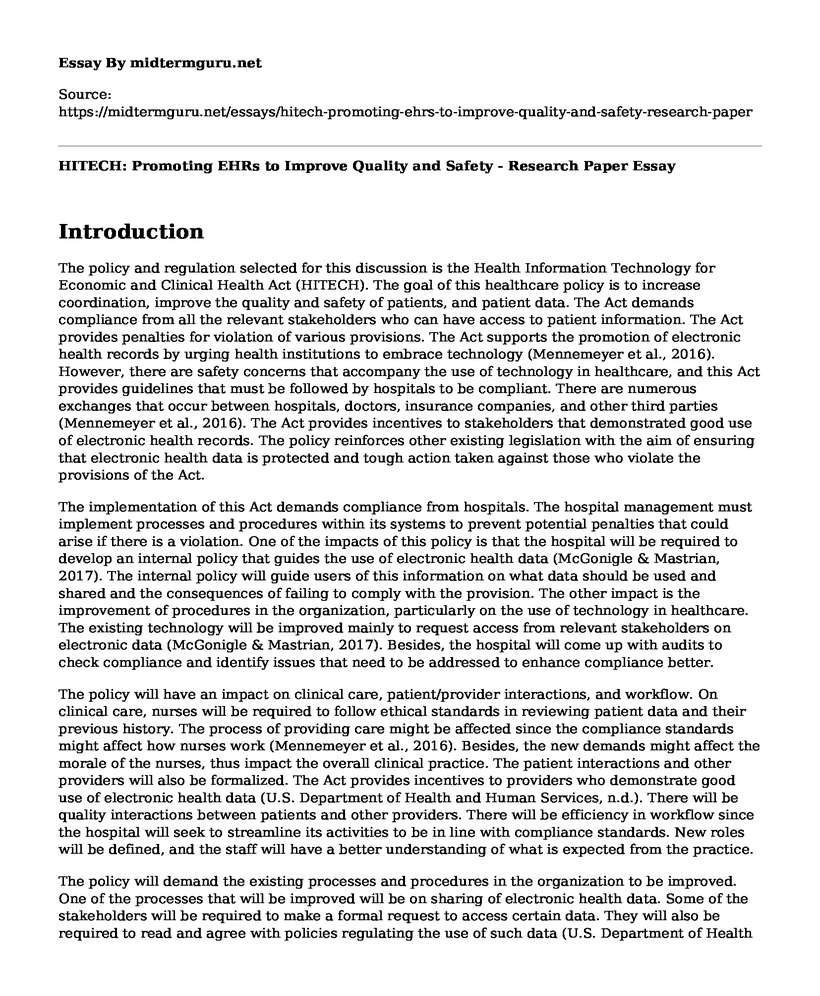Introduction
The policy and regulation selected for this discussion is the Health Information Technology for Economic and Clinical Health Act (HITECH). The goal of this healthcare policy is to increase coordination, improve the quality and safety of patients, and patient data. The Act demands compliance from all the relevant stakeholders who can have access to patient information. The Act provides penalties for violation of various provisions. The Act supports the promotion of electronic health records by urging health institutions to embrace technology (Mennemeyer et al., 2016). However, there are safety concerns that accompany the use of technology in healthcare, and this Act provides guidelines that must be followed by hospitals to be compliant. There are numerous exchanges that occur between hospitals, doctors, insurance companies, and other third parties (Mennemeyer et al., 2016). The Act provides incentives to stakeholders that demonstrated good use of electronic health records. The policy reinforces other existing legislation with the aim of ensuring that electronic health data is protected and tough action taken against those who violate the provisions of the Act.
The implementation of this Act demands compliance from hospitals. The hospital management must implement processes and procedures within its systems to prevent potential penalties that could arise if there is a violation. One of the impacts of this policy is that the hospital will be required to develop an internal policy that guides the use of electronic health data (McGonigle & Mastrian, 2017). The internal policy will guide users of this information on what data should be used and shared and the consequences of failing to comply with the provision. The other impact is the improvement of procedures in the organization, particularly on the use of technology in healthcare. The existing technology will be improved mainly to request access from relevant stakeholders on electronic data (McGonigle & Mastrian, 2017). Besides, the hospital will come up with audits to check compliance and identify issues that need to be addressed to enhance compliance better.
The policy will have an impact on clinical care, patient/provider interactions, and workflow. On clinical care, nurses will be required to follow ethical standards in reviewing patient data and their previous history. The process of providing care might be affected since the compliance standards might affect how nurses work (Mennemeyer et al., 2016). Besides, the new demands might affect the morale of the nurses, thus impact the overall clinical practice. The patient interactions and other providers will also be formalized. The Act provides incentives to providers who demonstrate good use of electronic health data (U.S. Department of Health and Human Services, n.d.). There will be quality interactions between patients and other providers. There will be efficiency in workflow since the hospital will seek to streamline its activities to be in line with compliance standards. New roles will be defined, and the staff will have a better understanding of what is expected from the practice.
The policy will demand the existing processes and procedures in the organization to be improved. One of the processes that will be improved will be on sharing of electronic health data. Some of the stakeholders will be required to make a formal request to access certain data. They will also be required to read and agree with policies regulating the use of such data (U.S. Department of Health and Human Services, n.d.). The other procedure will be on how to enroll patients into the hospital systems and the kind of data that will be retained by the organization. The organization will put in place a policy that demands the users of such information to seek relevant consent from the patient and in other cases, the hospital's informatics department.
References
McGonigle, D., & Mastrian, K. G. (2017). Nursing informatics and the foundation of knowledge (4th ed.). Burlington, MA: Jones & Bartlett Learning.
Mennemeyer, S. T., Menachemi, N., Rahurkar, S., & Ford, E. W. (2016). Impact of the HITECH act on physicians' adoption of electronic health records. Journal of the American Medical Informatics Association, 23(2), 375-379.
U.S. Department of Health and Human Services. (n.d.). Laws & regulations. Retrieved September 27, 2018, from https://www.hhs.gov/regulations/index.html
Cite this page
HITECH: Promoting EHRs to Improve Quality and Safety - Research Paper. (2023, Jan 31). Retrieved from https://midtermguru.com/essays/hitech-promoting-ehrs-to-improve-quality-and-safety-research-paper
If you are the original author of this essay and no longer wish to have it published on the midtermguru.com website, please click below to request its removal:
- Observation on the Level of Communication Between Parents and Children
- Essay on Clinical Scholarships for the DNP Programs
- Essay on Identification and Description of Niccolo Machiavelli
- How The Disease Shaped World History - Essay Sample
- Accurate Diagnosis: Essential for Quality Healthcare Delivery - Research Paper
- Risk Factors for Birth Defects: Smoking, Alcohol, Drugs, Nutrition - Research Paper
- Diagnosing Learning Disabilities: A Multi-Test Approach - Essay Sample







